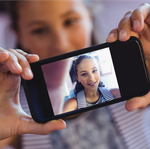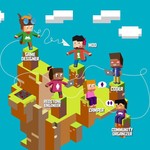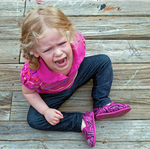Research overview
My core research interests are in envisioning, designing, and evaluating new technology-enabled interventions that support social-emotional (SE) skills development, especially for children and youth. This is an interdisciplinary area that has—so far—not received enough attention from HCI researchers; but also one with substantial real-world impact on the well-known challenges faced by mental health intervention providers.
Over the next 4-7 years, the research in my group will primarily focus on understanding how innovative technologies can enable a shift towards a new model of `situated interventions': i.e., interventions, where the users are empowered to learn SE skills directly in the everyday moments when SE competencies are needed, rather than through the currently predominant workshop and classroom-based approaches.
In doing so, my team and I will focus on unpacking a number of fundamental research questions across the technical (e.g. How do available technological capabilities map to key psychological concepts in existing evidence-based interventions?), psychological (e.g., How can the psychological mechanisms underpinning current programs be re-conceptualised and delivered in a situated manner through digital technology?), and socio-technical (e.g., How can we balance designing for acceptability and immediate users’ needs with the psychological intervention goals of leading to long-term effects?) research areas.
Specifically, we are developing interventions for two case study contexts — emotion regulation and positive parenting — that have been selected as two fundamental protective factors of child mental health; e.g., emotion regulation is emerging as one of the few possible transdiagnostic treatments across mental health disorders. The aim is to both develop innovative design patterns and intervention mechanisms that are exciting for HCI, but at the same time also develop robust intervention toolkits that can be deployed in real-world preventative as well as clinical contexts, enabling the medium-to-large scale RCT trials necessary to validate psychological efficacy of proposed mechanisms.
Methodologically, the work of our group is deeply rooted within user-centred design and design thinking approaches, with the understanding of the different but equally crucial bodies of knowledge brought by all stakeholders (e.g., children, parents, clinicians). We deliberately engage with interventions across mental health promotion, prevention, as well as clinical interventions to take advantage of the respective pros and cons (e.g., well defined mechanisms of change in clinical settings vs. ability to innovate and explore socio-technical designs in preventative contexts).
Smart Toys for emotion regulation
On-going research projects associated with the `smart toys' research agenda
Responsible innovation and robotic toys
Lead: Prof Marina Jirotka
Embedded in Prof Jirotka’s Established Career Fellowship, we are using Smart Toys as a case study to understand and develop responsible innovation approaches in the context of social robotics aimed at children. This includes both aiming to anticipate the potential consequences—positive and negative—of introducing such interactive technologies into family life; as well as investigating an innovative design feature: the Ethical Black Box that enables a post-hoc investigation, should an accident happen.
Slow media: Smartphones and wellbeing for youth
Lead: Prof Katie Davis
The joint project seeks to identify and organize the challenges that youth and their families experience as they engage with their smartphones, social media, and other networked technologies, and then use these empirical insights to design interventions that support media wellbeing in youth and families.
Supporting University Students in Regaining Control Over Digital Device Use
Lead: Dr. Ulrik Lyngs
Self-control struggles play a key role in many negative effects of digital device use on well-being, such as problematic use of social media. We are working with the University of Oxford’s Counselling Service, to design experiential training for students to address these issues.
Conflict resolution in Minecraft
Lead: Prof Katie Salen
This project investigates how multiple online games—such as Minecraft—can serve as powerful sites for youth social-emotional learning (e.g., conflict resolution and problem resolution skills). Through a series of long term research studies, supported by Connected Camps and Committee for Children, we have investigated how changes to online moderation techniques can drive youth self-empowerment and learning.
Situated, embedded, and scalable parenting interventions through emerging IoT technologies
In this project, we are interested to investigate how emerging IoT devices—such as Amazon Alexa or Google Home—could enable a new model for empowering parenting interventions.
Collaborators: Prof Max Van Kleek (Oxford), Prof Katie Davis (UW), Prof Edmund Sonuga-Barke (KCL), Prof Steven Scott (KLC), Prof Cathy Cresswell (Oxford)
Investigating the efficacy of Smart Toys in families (RCT)
We aim to evaluate the efficacy and effectiveness of the current prototype in delivering measurable change in emotion regulatory practices of children. In collaboration with Committee for Children, we are finalising the analysis of a repeated measures RCT with an active control (total N=134 families).
Collaborators: Prof Pedja Klasnja (Michigan), Prof Ben Hankin (Illinois), Prof Brett Ford (Toronto), Prof James Gross (Stanford), Committee for Children (Seattle)
Smart companion robotic toys for adolescent mental health
We aim to understand if/how the existing Smart Toys prototypes could be—in future—incorporated into mental health treatment approaches for youth (aged 16-24); and what further research & user-centred design steps would be required to address the needs of users and therapists.Collaborators: Prof Marina Jirotka (Oxford), Prof Ellen Townsend (Nottingham)
Developement of in-situ intervention with socially assistive robots for youth at-risk of self-harm
We aim to understand if/how the existing Smart Toys prototypes could be—in future—incorporated into mental health treatment approaches for youth (aged 16-25) who are at-risk of self-harm; and what further research & user-centred design steps would be required to address the needs of users.Collaborators: Prof Marina Jirotka (Oxford), Prof Ellen Townsend (Nottingham)
IoT in parenting
On-going research projects examining the potential of IoT technologies to transform existing parenting interventions
Responsible innovation and robotic toys
Lead: Prof Marina Jirotka
Embedded in Prof Jirotka’s Established Career Fellowship, we are using Smart Toys as a case study to understand and develop responsible innovation approaches in the context of social robotics aimed at children. This includes both aiming to anticipate the potential consequences—positive and negative—of introducing such interactive technologies into family life; as well as investigating an innovative design feature: the Ethical Black Box that enables a post-hoc investigation, should an accident happen.
Slow media: Smartphones and wellbeing for youth
Lead: Prof Katie Davis
The joint project seeks to identify and organize the challenges that youth and their families experience as they engage with their smartphones, social media, and other networked technologies, and then use these empirical insights to design interventions that support media wellbeing in youth and families.
Supporting University Students in Regaining Control Over Digital Device Use
Lead: Dr. Ulrik Lyngs
Self-control struggles play a key role in many negative effects of digital device use on well-being, such as problematic use of social media. We are working with the University of Oxford’s Counselling Service, to design experiential training for students to address these issues.
Conflict resolution in Minecraft
Lead: Prof Katie Salen
This project investigates how multiple online games—such as Minecraft—can serve as powerful sites for youth social-emotional learning (e.g., conflict resolution and problem resolution skills). Through a series of long term research studies, supported by Connected Camps and Committee for Children, we have investigated how changes to online moderation techniques can drive youth self-empowerment and learning.
Situated, embedded, and scalable parenting interventions through emerging IoT technologies
In this project, we are interested to investigate how emerging IoT devices—such as Amazon Alexa or Google Home—could enable a new model for empowering parenting interventions.
Collaborators: Prof Max Van Kleek (Oxford), Prof Katie Davis (UW), Prof Edmund Sonuga-Barke (KCL), Prof Steven Scott (KLC), Prof Cathy Cresswell (Oxford)
Investigating the efficacy of Smart Toys in families (RCT)
We aim to evaluate the efficacy and effectiveness of the current prototype in delivering measurable change in emotion regulatory practices of children. In collaboration with Committee for Children, we are finalising the analysis of a repeated measures RCT with an active control (total N=134 families).
Collaborators: Prof Pedja Klasnja (Michigan), Prof Ben Hankin (Illinois), Prof Brett Ford (Toronto), Prof James Gross (Stanford), Committee for Children (Seattle)
Smart companion robotic toys for adolescent mental health
We aim to understand if/how the existing Smart Toys prototypes could be—in future—incorporated into mental health treatment approaches for youth (aged 16-24); and what further research & user-centred design steps would be required to address the needs of users and therapists.Collaborators: Prof Marina Jirotka (Oxford), Prof Ellen Townsend (Nottingham)
Developement of in-situ intervention with socially assistive robots for youth at-risk of self-harm
We aim to understand if/how the existing Smart Toys prototypes could be—in future—incorporated into mental health treatment approaches for youth (aged 16-25) who are at-risk of self-harm; and what further research & user-centred design steps would be required to address the needs of users.Collaborators: Prof Marina Jirotka (Oxford), Prof Ellen Townsend (Nottingham)
External collaborations
On-going research projects led by other researchers
Responsible innovation and robotic toys
Lead: Prof Marina Jirotka
Embedded in Prof Jirotka’s Established Career Fellowship, we are using Smart Toys as a case study to understand and develop responsible innovation approaches in the context of social robotics aimed at children. This includes both aiming to anticipate the potential consequences—positive and negative—of introducing such interactive technologies into family life; as well as investigating an innovative design feature: the Ethical Black Box that enables a post-hoc investigation, should an accident happen.
Slow media: Smartphones and wellbeing for youth
Lead: Prof Katie Davis
The joint project seeks to identify and organize the challenges that youth and their families experience as they engage with their smartphones, social media, and other networked technologies, and then use these empirical insights to design interventions that support media wellbeing in youth and families.
Supporting University Students in Regaining Control Over Digital Device Use
Lead: Dr. Ulrik Lyngs
Self-control struggles play a key role in many negative effects of digital device use on well-being, such as problematic use of social media. We are working with the University of Oxford’s Counselling Service, to design experiential training for students to address these issues.
Conflict resolution in Minecraft
Lead: Prof Katie Salen
This project investigates how multiple online games—such as Minecraft—can serve as powerful sites for youth social-emotional learning (e.g., conflict resolution and problem resolution skills). Through a series of long term research studies, supported by Connected Camps and Committee for Children, we have investigated how changes to online moderation techniques can drive youth self-empowerment and learning.
Situated, embedded, and scalable parenting interventions through emerging IoT technologies
In this project, we are interested to investigate how emerging IoT devices—such as Amazon Alexa or Google Home—could enable a new model for empowering parenting interventions.
Collaborators: Prof Max Van Kleek (Oxford), Prof Katie Davis (UW), Prof Edmund Sonuga-Barke (KCL), Prof Steven Scott (KLC), Prof Cathy Cresswell (Oxford)
Investigating the efficacy of Smart Toys in families (RCT)
We aim to evaluate the efficacy and effectiveness of the current prototype in delivering measurable change in emotion regulatory practices of children. In collaboration with Committee for Children, we are finalising the analysis of a repeated measures RCT with an active control (total N=134 families).
Collaborators: Prof Pedja Klasnja (Michigan), Prof Ben Hankin (Illinois), Prof Brett Ford (Toronto), Prof James Gross (Stanford), Committee for Children (Seattle)
Smart companion robotic toys for adolescent mental health
We aim to understand if/how the existing Smart Toys prototypes could be—in future—incorporated into mental health treatment approaches for youth (aged 16-24); and what further research & user-centred design steps would be required to address the needs of users and therapists.Collaborators: Prof Marina Jirotka (Oxford), Prof Ellen Townsend (Nottingham)
Developement of in-situ intervention with socially assistive robots for youth at-risk of self-harm
We aim to understand if/how the existing Smart Toys prototypes could be—in future—incorporated into mental health treatment approaches for youth (aged 16-25) who are at-risk of self-harm; and what further research & user-centred design steps would be required to address the needs of users.Collaborators: Prof Marina Jirotka (Oxford), Prof Ellen Townsend (Nottingham)







